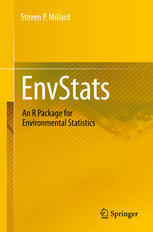

Most ebook files are in PDF format, so you can easily read them using various software such as Foxit Reader or directly on the Google Chrome browser.
Some ebook files are released by publishers in other formats such as .awz, .mobi, .epub, .fb2, etc. You may need to install specific software to read these formats on mobile/PC, such as Calibre.
Please read the tutorial at this link: https://ebookbell.com/faq
We offer FREE conversion to the popular formats you request; however, this may take some time. Therefore, right after payment, please email us, and we will try to provide the service as quickly as possible.
For some exceptional file formats or broken links (if any), please refrain from opening any disputes. Instead, email us first, and we will try to assist within a maximum of 6 hours.
EbookBell Team

4.4
52 reviewsThis book describes EnvStats, a new comprehensive R package for environmental statistics and the successor to the S-PLUS module EnvironmentalStats for S-PLUS (first released in 1997). EnvStats and R provide an open-source set of powerful functions for performing graphical and statistical analyses of environmental data, bringing major environmental statistical methods found in the literature and regulatory guidance documents into one statistical package, along with an extensive hypertext help system that explains what these methods do, how to use these methods, and where to find them in the environmental statistics literature. EnvStats also includes numerous built-in data sets from regulatory guidance documents and the environmental statistics literature.
This book shows how to use EnvStats and R to easily:
* graphically display environmental data
* plot probability distributions
* estimate distribution parameters and construct confidence intervals on the original scale for commonly used distributions such as the lognormal and gamma, as well as do this nonparametrically
* estimate and construct confidence intervals for distribution percentiles or do this nonparametrically (e.g., to compare to an environmental protection standard)
* perform and plot the results of goodness-of-fit tests
* compute optimal Box-Cox data transformations
* compute prediction limits and simultaneous prediction limits (e.g., to assess compliance at multiple sites for multiple constituents)
* perform nonparametric estimation and test for seasonal trend (even in the presence of correlated observations)
* perform power and sample size computations and create companion plots for sampling designs based on confidence intervals, hypothesis tests, prediction intervals, and tolerance intervals
* deal with non-detect (censored) data
* perform Monte Carlo simulation and probabilistic risk assessment
* reproduce specific examples in EPA guidance documents
EnvStats combined with other R packages (e.g., for spatial analysis) provides the environmental scientist, statistician, researcher, and technician with tools to “get the job done!”